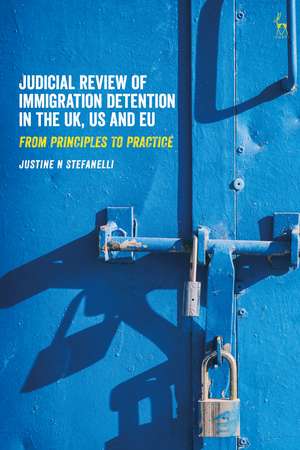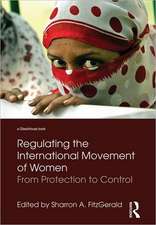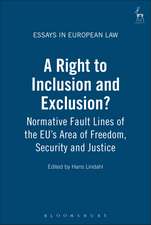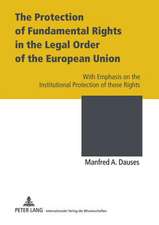Judicial Review of Immigration Detention in the UK, US and EU: From Principles to Practice
Autor Justine N Stefanellien Limba Engleză Hardback – 22 ian 2020
| Toate formatele și edițiile | Preț | Express |
|---|---|---|
| Paperback (1) | 298.06 lei 6-8 săpt. | +85.81 lei 7-13 zile |
| Bloomsbury Publishing – 28 iul 2021 | 298.06 lei 6-8 săpt. | +85.81 lei 7-13 zile |
| Hardback (1) | 569.29 lei 6-8 săpt. | |
| Bloomsbury Publishing – 22 ian 2020 | 569.29 lei 6-8 săpt. |
Preț: 569.29 lei
Preț vechi: 816.25 lei
-30% Nou
Puncte Express: 854
Preț estimativ în valută:
108.94€ • 116.49$ • 90.83£
108.94€ • 116.49$ • 90.83£
Carte tipărită la comandă
Livrare economică 17 aprilie-01 mai
Preluare comenzi: 021 569.72.76
Specificații
ISBN-13: 9781509930456
ISBN-10: 1509930450
Pagini: 248
Dimensiuni: 156 x 234 x 20 mm
Greutate: 0.53 kg
Editura: Bloomsbury Publishing
Colecția Hart Publishing
Locul publicării:London, United Kingdom
ISBN-10: 1509930450
Pagini: 248
Dimensiuni: 156 x 234 x 20 mm
Greutate: 0.53 kg
Editura: Bloomsbury Publishing
Colecția Hart Publishing
Locul publicării:London, United Kingdom
Caracteristici
Rigorous analysis of case law in the field of immigration detention
Notă biografică
Justine N Stefanelli is Director of Publications and Research at the American Society of International Law in Washington DC.
Cuprins
1. Introduction I. The Detention Machine II. Immigration Detention in Literature III. Issues ExploredIV. Approach of this Book V. Structure of the Book 2. Liberty and the Historic Context of Immigration Detention I. Introduction II. The United Kingdom III. The United States IV. The European Union V. Conclusion 3. Current Legal Frameworks I. Introduction II. Origins of the Modern Systems III. Detention Authorities IV. Grounds for Detention V. Non-statutory Guidance on Detention Decision-Making VI. Additional Detention Provisions in the Return Directive VII. Conclusion 4. Judicial Intervention into Detention I. Introduction II. Courts and Judges III. Judicial Review Proceedings IV. Legal Representation and Access to Justice for Detainees V. Modern Judicial Review of Detention VI. Conclusion 5. Balancing Factors I. Introduction II. Case Basics III. The Legality Tests IV. Likelihood of Removal and Due Diligence V. Assessing Risk VI. Detainee Non-co-operation VII. Pursuit of Legal Remedies against Removal or Deportation VIII. Conclusion 6. Using the Law I. Introduction II. The Doctrine of Precedent III. Fundamental Rights IV. Impact of Detention Time Limits on Judicial Decision-Making V. Quality of Law VI. Conclusion 7. The Business of JudgingI. Introduction II. Judges as Fact-Finders, Reviewers or Law-Makers III. The Role of Deference IV. Conclusion 8. Conclusion I. Introduction II. Detention: An Origin Story III. Accounting for Outcomes IV. Moving Forward





















